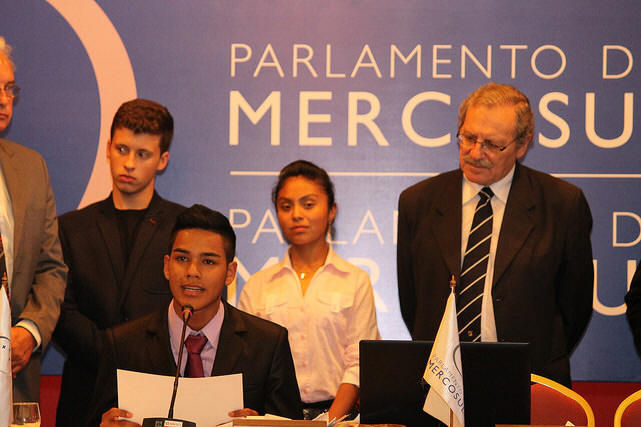Youth Contribute to Education and Development Policy in MERCOSUR

What type of middle school
do you want for the region? That was the
question posed to over 260 young citizens participating in
“Parlamento Juvenil MERCOSUR”, funded by the OAS Development
Cooperation Fund (formerly FEMCIDI). Over the past five years, this
project has been providing opportunities for young people to be part
of the policy-making process as it relates to education strategy in
the MECOSUR Region.
With the intent of maintaining open channels for dialogue and
youth participation being advocated by the regional Educational
Sector of MERCOSUR, participating member states have also proposed
the strengthening of an institutionalized space for dialogue with
the young students to hear “first hand” about the challenges that
the education system is facing and the contributions that youth can
offer to overcome them.
After a strong and participatory process of dialogue,
deliberations and consensus building, the civic commitment of the
young people of MERCOSUR was reflected in the Declaration of
Piriápolis which recommended concrete action on six key themes,
including: inclusive education, regional integration, human rights,
gender, civic participation, and youth and employment.
In the words of Santiago Benitez, an Argentinian
student participating in the Assembly, the Final Youth Declaration
presented to parliamentarians at the
XXXII Regular Meeting of the Parlamento MERCOSUR on November
10, 2014 in Montevideo,
“pursues the dream of millions of young Latin Americans who want to
transform their high school education.”
 The project is coordinated by the Ministry of
Education of Argentina, with the participation of the Ministries of
Education of Bolivia, Brazil, Colombia and Uruguay, and the MERCOSUR
Parliament.
Parlamento Juvenil is
consistent with the educational strategies of participating
countries which are seeking to include the involvement of high
school students in addressing the needs and perspectives of young
people in order to strengthen their participation in the democratic
process.
The project is coordinated by the Ministry of
Education of Argentina, with the participation of the Ministries of
Education of Bolivia, Brazil, Colombia and Uruguay, and the MERCOSUR
Parliament.
Parlamento Juvenil is
consistent with the educational strategies of participating
countries which are seeking to include the involvement of high
school students in addressing the needs and perspectives of young
people in order to strengthen their participation in the democratic
process.
The first phase of this project took place
between 2009-2010 when in 2010, youth representative presented a
final declaration to then President Jose Alberto Mujica Cordano, at
the XXVI Plenary Session of Parlamento MERCOSUR. In addition, the
project developed and distributed school curricula that was adopted
in 19,676 schools, reaching over 3.2 million youths from
participating countries.
Since then, the project has
continued to broaden the participation of young middle school
students by institutionalizing spaces for dialogue on issues related
to the decisions taken on their educational development, on public
policies directed towards youth, and on the process of regional
integration. In this regard and as part of the preparatory process
for the Parlamento Juvenil
2014, five fora were held at the national level, including
teacher training initiatives on regional integration,
education in democratic values and practices, the strengthening of
pedagogical knowledge, and efforts to improve national curricula in
all of these areas.
Kim Osborne, Chief of the Technical Cooperation
Section at the OAS-SEDI highlighted the results of the project and
the value of strong partnerships in realizing regional aspirations,
emphasizing that “we are very pleased that the Development
Cooperation Fund has been able to work with the
Parlamento Juvenil MERCOSUR to reach millions of young people in the
region, with a view
towards ensuring that their ideas are included in the development of
modern and relevant public policies that directly affect them.”

